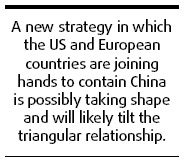Op-Ed Contributors
US and Europe scrambling to adjust to changing world order
By Yu Xiang (China Daily)
Updated: 2010-02-25 07:52
 |
Large Medium Small |
There has always existed a kind of invisible triangle of games between China, Europe and the United States. Every time China and the US have been at odds, China's relations with Europe has warmed. Similarly, Beijing's ties with Washington would improve once it had a difficult time with European countries.
However, this push-and-pull relationship is undergoing delicate changes, as indicated by a series of disputes between China and the two powers since the beginning of the global financial crisis and in recent months. A new strategy in which the US and European countries are joining hands to contain China is possibly taking shape and will likely tilt the triangular relationship.
Tension in Sino-US relations has been seething on a number of issues, ranging from Google's exit threat from China, the US arms sale to Taiwan, the meeting between the Dalai Lama and US President Barack Obama, and the issue of China's so-called military transparency. Tension with the US has escalated as China's disputes with Europe remain unresolved on issues such as anti-dumping, China's prosecution of British drug trafficker Akmal Shaikh, and disagreements on who is responsible for the discounted Copenhagen climate talks. The US and European countries have also moved forward together in lashing out at China for its alleged failure to correct the imbalance in international trade as the West persistently demands, refusing to side with them on the Iran nuclear issue, the Myanmar situation, African affairs and global climate change.

| ||||
The military superiority established by Europe five decades ago and its extensive political influences are waning. Faced with a decline in US forces and its international might, Obama has in many public speeches to his countrymen said the US is "one of the most important countries", an edit from the previous rhetoric in describing the US as "the most important".
The change in rhetoric reflects to some extent the recognition by the president of the world's sole superpower that the US is in decline. However, the long-established centralism by the US and Europe and their sense of cultural superiority make it difficult for them to accept China's rise and to voluntarily give up their long-held dominance in international affairs. Despite being plagued by their differences on some issues, the task of dealing with the challenge from China, perceived as a common strategic competitor, has brought the US and European countries closer than ever.
China's economy grew by 8.7 percent last year and realized its V-shaped recovery, as indicated by recent economic data. The country's shining economy is in sharp contrast with discouraging performances from the US and European economies and has stoked resentment in the American and European public toward their respective governments.
China is an ideal country for the US and European countries to shift their domestic dissatisfactions. China's domestic policies, from its financial and monetary policy, to its exchange rate of the currency, and its trade strategy have been blamed for the snail's pace of recovery for the US and European countries. This explains why the US and European countries have used protectionism in recent months against China. On Jan 18, Herman Van Rompuy, the EU president, emphasized that a no-lower-than 2 percent average economic growth should be the bloc's top priority. In his State of the Union address on Jan 27, Obama said his focus was to increase jobs, pursue development and reduce the deficit this year. It is expected that a series of export-oriented measures by the US and European countries will likely increase trade frictions with China.
Pressuring China is also taken by the US as an effective way to ease growing pressures at home. Obama's "smart diplomacy" has allegedly failed to bring American people changes promised during his election campaign. Public dismay toward Obama has contributed to the drastic decline of the president's approval ratings. In the UK, France and Germany and countries beyond, large-scale anti-government protests have erupted.
In the eyes of European countries, building an allied front against China is in the continent's interests. Since the global financial crisis, talks of G2 (China and the US) have been spreading throughout the international community.
The idea, although it has failed to be accepted by China or the US, has clipped the nerve of Europe. Becoming closer to the US, in Europe's eyes, will help foil the possible US and China governance of global affairs.
In the past year, European think tanks and media have reflected on Europe's China policy, holding that the EU's orientation of China as a responsible shareholder is wrong. With the ratification of the Treaty of Lisbon - the EU constitution - the bloc is under more pressure to have a unified voice and a tougher image to present to the outside world.
At a Jan 11 hearing, EU foreign policy chief Catherine Ashton claimed the community should establish new foreign policies to deal with the rise of emerging countries led by China and be well prepared for a new international order. The changing domestic political landscape in Europe is likely to prompt the EU to adopt a tougher approach in dealing with the Asian nation. That will be a test for China's diplomatic will and skill.
The author is a researcher with the China Institutes of Contemporary International Relations.
(China Daily 02/25/2010 page8)













